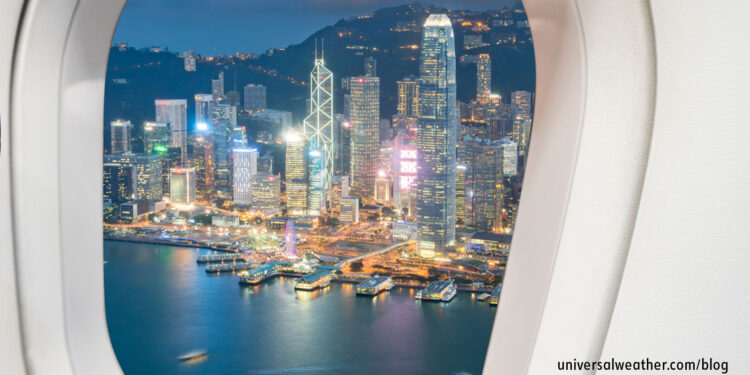Business Aviation Operating to Hong Kong: Hotels, Local Transport, and Security

This business aviation blog post is part of a series on operating in Hong Kong and continues from our last article: “Business Aviation Operating to Hong Kong – Flight Planning & Weather.”
Hong Kong offers an attractive range of accommodation options for crews who are overnighting or just looking for a few hours rest. While it’s not normally problematic or overly expensive to book crew accommodations close to Hong Kong (VHHH) or in the central city district, there are times when hotel availability becomes an issue. We always recommend confirming crew accommodations as soon as a schedule is known.
The following is an overview of what you need to know:
1. Hotel options
There are plenty of good 4- and 5-star crew accommodation options to consider in central Hong Kong, including a full range of international chains. Alternatively, crews have the option of several 4-star hotels close to VHHH. Be prepared, however, for restricted airport hotel options as these properties regularly sell out. We normally suggest that crews book accommodations in central Hong Kong, unless you’re there for just a few hours or have a short overnight stay.
2. Accommodation costs
Average cost of 4- or 5- star hotels in central Hong Kong runs about 200 USD/night. Due to a general slowdown in visitors from the China mainland over recent months, hotel occupancy rates in the city have dropped somewhat, and more hotel options now seem to be available. Note that due to limited availability of 4-star hotels close to the airport, prices are often higher than equivalent central Hong Kong options. Room prices normally fluctuate depending on the season and major holiday periods. Busiest months in Hong Kong, in terms of hotel demand, are April, October, and November. Other high demand periods include Chinese Lunar New Year, New Year’s Eve, Christmas Day, and long weekends.
3. Impact of local events on accommodation availability
Hong Kong hosts numerous trade fairs and special events yearly. Most of these events take place during the April, October, and November high season, and there are times when it becomes difficult to source any sort of accommodations in the Hong Kong area. In extreme cases, crews may need to travel to Macau, about a one hour fast ferry trip, to find available accommodations.
4. Additional hotel considerations
Ground handlers often have contracts and special rates available with certain airport and central area hotels. These options often translate into cost savings, but they’re usually limited during high traffic periods. Short notice accommodations requests can often be arranged, particularly off-season. When traveling between VHHH and your hotel consider prepaid transport (car with driver), especially if you have a short overnight stop and are looking to maximize crew rest. Be mindful that there are many hotels in Hong Kong with similar names, and from time to time, it may be confusing finding your hotel.
5. Rental vehicles should be avoided
Unless you’re very familiar with the Hong Kong area and road structure, we recommend avoiding rental cars. It can be difficult navigating narrow roads, one-way streets, and high traffic congestion between 0900-1800 local. Additionally, finding parking in the central district can be quite challenging due to limited parking options available.
6. Public transport and taxis
Hong Kong offers a wide range of dependable and safe public transport options. A high speed train service connects VHHH with the central district in about 30 minutes. Public taxis are usually very good in this region, and most drivers speak English. Hong Kong also has a very good Mass Transit Rail (MTR) underground train network that’s a particularly convenient means of moving within the city and the busy central district.
7. Documentation requirements
It’s recommended, but not required, that passports have at least six months remaining validity when visiting Hong Kong. Visas are required for certain nationalities of passengers and crew, and you must obtain all required visas prior to arrival to avoid immediate deportation. Be mindful that visas for Hong Kong are entirely different than visas for the China mainland. Your Hong Kong visa will not permit travel to anywhere other than Hong Kong. For more information on visa requirements see the Hong Kong Immigration Department website.
8. Arrival cards
Hong Kong requires that all passengers and crew arriving on general aviation (GA) aircraft fill out and submit arrival cards when entering the territory. In most cases, it’s standard practice for your local ground handler to complete most of this form so that only signatures are required from passengers and crew.
9. Health and vaccination requirements
Hong Kong has no published vaccination requirements at this time. However, all passengers/crew undergo body temperature scanning upon arrival to ensure no one is sick. If airport authorities determine that a passenger or crew member has a fever they’ll question you further and/or take you to a medical clinic for additional checks.
10. Agricultural restrictions
Hong Kong currently has very few agricultural restrictions in place that impact arriving GA aircraft. While restrictions regarding importing raw meat products exist, there are no restrictions on bringing fruits, vegetable, and/or raw fish into the territory. Catering items can usually be stored at the ground handler office for a fee. Should you wish to store catering with the ground handler, it’s best to confirm in advance if this is possible. There are certain items the ground handler will not be willing to store, for hygienic reasons.
11. Additional restrictions
The Hong Kong Agriculture, Fisheries and Conservation Department publish certain restrictions in terms of animal products and endangered species. More can be found on these restrictions on their website. Be advised that Hong Kong is very strict on temporary importation of firearms and weapons, and it’s best to confirm such requirements in advance if you’ll have weapons onboard. If you wish to bring a pet into Hong Kong be sure to confirm all applicable requirements/procedures well in advance of day of operation. More information on temporary importation of animals can be found on the Agriculture, Fisheries and Conservation Department website.
12. Security considerations
Airport security at VHHH is of high standards, and aircraft guards are not recommended at this location for most operators. In terms of off-airport security there are no areas of the city that must be avoided. It’s best practice, however, to be aware of pick pocketing risks when on public transport and in crowded city streets.
13. Overnight stays
An overnight or longer stop in Hong Kong is something for crews to look forward to. Aircraft handling services are excellent at VHHH, and there’s plenty to do on longer stays. Aside from shopping and trying local cuisines also consider local museums, hiking, and riding the historic Star Ferry system across the picturesque Hong Kong harbor. Your ground handler will be able to provide recommendations of things to do during your stay.
14. Additional reading: Business Aircraft Ops to Hong Kong – Series Index
Note: Links will be updated as articles are published.
- Part 1 – Ground handling
- Part 2 – Fuel, security and additional services
- Part 3 – Airport slots
- Part 4 – Permits and PPRs
- Part 5 – Flight planning and weather
- Part 6 – Hotels and local area
Conclusion
There are plenty of hotels to choose from when traveling to Hong Kong. Due make note, however, that during the high season there may be limited options or prices may be increased. Pre-paid transportation is recommended when traveling to this location due to congestion and lack of parking in the city. Be aware of stringent requirements for bringing weapons, and be sure to see requirements for bringing animals into the country.
Questions?
If you have any questions about this article or would like assistance planning your next trip to Hong Kong, contact Alan Pong at alanpong@univ-wea.com.




